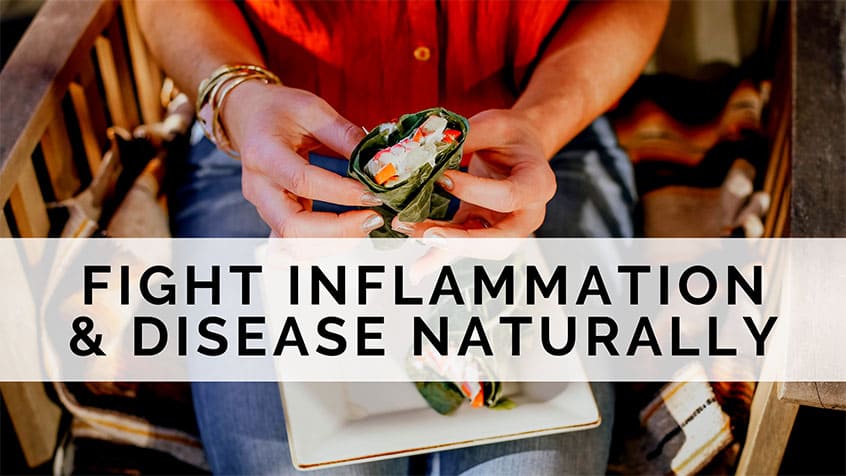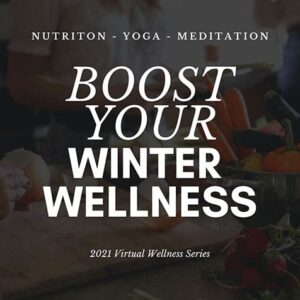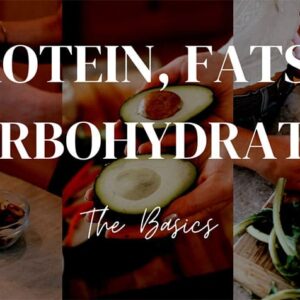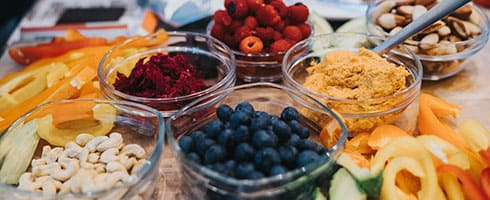
Fight Inflammation and Disease Naturally
The secret to long-term health? Focus on lowering inflammation in your body.
Inflammation is a vital part of the body’s immune response. It helps the body heal after an injury; defend itself against viruses and bacteria, and repair damaged tissue. However, too much immune response can cause the inflammation response to become “always on” and chronic. Chronic inflammation has been shown to play a main role in the development of diseases including cardiovascular disease, cancer, and diabetes. More recent research has also shown a correlation to psychological disorders, especially depression. Stress, lack of exercise, genetic predisposition, and exposure to toxins (environmental and food) can all contribute to chronic inflammation. The best strategy for containing and reducing long-term disease risks is to learning how specific foods, as well as lifestyle choices, can influence the inflammatory process.
How do you know if you are dealing with chronic inflammation?
People who are suffering often have one or more of the following symptoms. A test by your doctor can also tell you by measuring inflammatory markers in your blood, including C-reactive protein (CRP), homocysteine, TNF alpha and IL-6.
| Belly Fat
High blood sugar levels Digestive issues Fatigue Skin issues like eczema |
Allergies
Puffiness in the face Inflamed gums Arthritis and joint pain Depression, anxiety, brain fog |
Erectile dysfunction (in men)
Frequent headaches and brain fog Weight Gain |
The Solution
Take a holistic approach to maintaining your health by avoiding things that contribute to inflammation and focus on fighting the inflammation you have.
Nourish
Diet plays a huge role in either fighting or contributing to inflammation. If you want to reducing inflammation, focus your diet on anti-inflammatory foods, like:
- Fiber rich, whole foods: Base your diet on whole, nutrient-dense foods, and avoid processed products.
- Foods rich in antioxidants: These include fresh vegetables, fruits, herbs and spices. Antioxidants work by reducing levels of free radicals, that are contributing to inflammation. Brightly colored foods have the highest amounts.
- Eat balanced meals: An anti-inflammatory diet includes a healthy balance of protein, carbohydrates and fat at each meal. Eating a wide variety of vegetables, especially green leafy vegetables, will help make sure you meet your body’s needs for vitamins, minerals, fiber and water. Eat the rainbow!
- Remove any food intolerances: Identify and remove any foods that cause distress in your body. Your body’s reaction to these foods contributes to inflammation.
- Focus on low-carb foods: A low-carb diet reduces inflammation, particularly for people who are obese or have metabolic syndrome.
- Eat mostly plant based: Vegetarian diets have also been shown to help reduce inflammation.
- Eat only pasture-raised meat and poultry: Avoid factory farmed food and monitor portions. A 3oz is a good starter serving (a deck of cards). If you are active, sick, still growing, or growing someone (pregnant) your needs will be higher.
- Support your gut: Focus on eating more good bacteria and less bad bacteria. Eat lots of fermented foods and limit foods that ruin beneficial gut bacteria, like sugar, processed foods, and excessive animal fats and protein.
- Choose the right oils: Olive, avocado and coconut are great healthy options. Stay away from hydrogenated oils and fats. Especially avoid corn, safflower, sunflower, soy and vegetable oils.
Best food choices to fight inflammation.
The most potent anti-inflammatory foods to include (always organic & wild):
-
- Omega 3’s from cold water fish – fights inflammation and supports brain health
- Leafy greens – kale, spinach, collard greens, and Swiss chard contain powerful antioxidants, flavonoids, carotenoids, and vitamin C — all of which help protect against cellular damage
- Blueberries: low in sugar, high in fiber and antioxidants
- Tea: Tulsi and Matcha are some of the best choices
- Fermented veggies: the majority of inflammatory diseases start in your gut, as the result of an imbalanced microbiome. Variety is key with fermented veggies. Go for diversity over quantity. Options include kefir, natto, kimchee, miso, tempeh, pickles, sauerkraut, and olives.
- Medicinal mushrooms: mushrooms contain strong compounds with the natural ability to discourage inflammation and inhibit oxidative stress. Shiitake mushrooms are a great choice.
- Garlic: Garlic offers benefits on multiple levels, including anti-bacterial, anti-viral, anti-fungal, and antioxidant properties.
- Herbs and spices: Apply liberally! Herbs and spices are among the most potent anti-inflammatory ingredients available, ounce for ounce.
Avoid these foods to fight inflammation.
Some foods are notorious for promoting inflammation. Avoid the following completely, if possible:
- Sugary beverages: Sugar-sweetened drinks and fruit juices.
- Refined carbs: White bread, white pasta, etc.
- Desserts: Cookies, candy, cake and ice cream.
- Processed meat: Hot dogs, bologna, sausages, etc.
- Processed snack foods: Crackers, chips and pretzels.
- Certain oils: Processed seed and vegetable oils like soybean and corn oil.
- Trans fats: Foods with “partially hydrogenated” in the ingredients list.
- Alcohol: Excessive alcohol consumption.
Anti-Inflammatory super stars:
- Vegetables: Broccoli, kale, Brussels sprouts, cabbage, cauliflower, etc.
- Low Sugar Fruit: Especially deeply colored berries like grapes and cherries.
- High-fat fruits: Avocados and olives.
- Healthy fats: Olive oil coconut oil.
- Cold Water Fatty fish: Salmon, sardines, herring, mackerel and anchovies.
- Nuts: Almonds and other nuts.
- Peppers: Bell peppers and chili peppers.
- Chocolate: Dark chocolate.
- Herbs and Spices: Such as turmeric, fenugreek and cinnamon.
- Tea: Green tea
Supplements can help give you an extra boost in your fight against inflammation.
Certain supplements can boost the anti-inflammatory effects of foods. Always check with your doctor before starting any supplements.
- Alpha-Lipoic Acid: Alpha-lipoic acid is a fatty acid made by your body that protects your cells from damage and reduces inflammation and may help reduce blood levels of several inflammatory markers. Recommended dosage: 300–600 mg daily. Potential side effects: None if taken at the recommended dosage. If you also take diabetes medication, then you may need to monitor your blood sugar levels. Not recommended for: Pregnant women.
- Curcumin: Curcumin is a component of the spice turmeric and has been shown to decrease inflammation in diabetes, heart disease, inflammatory bowel disease and cancer. It also appears to be very beneficial for reducing inflammation and improving symptoms of osteoarthritis and rheumatoid arthritis. Curcumin is poorly absorbed when taken on its own, but you can boost its absorption by as much as 2,000% by taking it with piperine, found in black pepper. Some supplements also contain a compound called bioperine, which works just like piperine and increases absorption. Recommended dosage: 100–500 mg daily, when taken with piperine. Doses up to 10 grams per day have been studied and are considered safe, but they may cause digestive side effects. Potential side effects: None if taken at the recommended dosage. Not recommended for: Pregnant women.
- Fish Oil: Fish oil supplements contain omega-3 fatty acids, which are vital to good health. They can decrease the inflammation associated with diabetes, heart disease, cancer and many other conditions. Recommended dosage: 1–1.5 grams of omega-3s from EPA and DHA per day. Look for fish oil supplements with undetectable mercury content. Potential side effects: Fish oil may thin the blood at higher doses, which can increase bleeding. Not recommended for: People taking blood thinners or aspirin, unless authorized by their doctor.
- Ginger: Two components of ginger, gingerol and zingerone, may reduce the inflammation linked to colitis, kidney damage, diabetes and breast cancer. There’s also evidence suggesting ginger supplements can decrease inflammation and muscle soreness after exercise. Recommended dosage: 1 gram daily, but up to 2 grams is considered safe. Potential side effects: None at the recommended dosage. However, higher dosages may thin the blood, which can increase bleeding. Not recommended for: People who take aspirin or other blood thinners, unless authorized by a doctor.
- Resveratrol: Resveratrol is an antioxidant found in grapes, blueberries and other fruits with purple skin. It is also found in red wine and peanuts. Resveratrol supplements may reduce inflammation in individuals with heart disease, insulin resistance, gastritis, ulcerative colitis and other conditions. Recommended dosage: 150–500 mg per day (56). Potential side effects: None at the recommended dosage, but digestive issues may occur with large amounts (5 grams per day). Not recommended for: People who take blood thinning medications, unless approved by their doctor.
- Spirulina: Spirulina is a type of blue-green algae with strong antioxidant effects. Studies have shown that it reduces inflammation, leads to healthier aging and may strengthen the immune system. Recommended dosage: 1–8 grams per day, based on current studies. Spirulina has been evaluated by the US Pharmacopeial Convention and is considered safe (67). Potential side effects: Aside from allergy, none at the recommended dosage. Not recommended for: People with immune system disorders or allergies to spirulina or algae.
Move
Inactivity promotes inflammation. Avoid sitting for longer than 50 minutes at a stretch, consider a standing desk, and move your body for at least 30 minutes everyday.
- Regular exercise: Exercise can decrease inflammatory markers and the risk of chronic disease. A recent study showed that regardless of weight or body mass index, people who did at least two and a half hours of moderate exercise each week lowered their markers of inflammation by at least 12 percent.
- Avoid Sitting: avoiding sitting as much as possible, ideally striving to sit for less than three hours a day. A stand-up desk is a great option if you have an office job. You need near-continuous movement throughout the day. At the bare minimum, you need to get out of your chair every 50 minutes or so.
- HIIT Exercise Offers Anti-Inflammatory Benefits: High-intensity interval training (HIIT) is one of the most effective and efficient ways to capture and maximize the benefits exercise has to offer. It also offers anti-inflammatory benefits that you cannot get with milder, less strenuous exercise. High-intensity weight training may offer additional benefits over other forms of HIIT training. High intensity training stimulates your muscles to release anti-inflammatory myokines, which increase your insulin sensitivity and glucose use inside your muscles. They also increase liberation of fat from adipose cells, and the burning of the fat within the skeletal muscle. Myokines inhibit the release and the effect of inflammatory cytokines produced by body fat.
- Rest is important: Too much exercise can contribute to inflammation. Do not over train and allow your body to recover in between sessions.
Thrive
- Reduce Stress: Stress has been shown to play a large role when it comes to inflammation and autoimmune disease. Exposure to chronic stress makes immune cells more likely to attack the body’s own tissue and trigger an autoimmune response. Improving the way you and your brain cope with stress can help the inflammation in your body calm down as well.
- Sleep Longer: Getting enough sleep is extremely important. Researchers have found that a poor night’s sleep increases inflammation. Shorting yourself on even a few hours of sleep each night can trigger pro-inflammatory changes. Aim for at least seven hours nightly. To improve your sleep, turn off electronic devices well before bedtime and use blackout curtains to block outside light.
- Create a Breath Practice: Mind-body therapies reduce markers of inflammation. A simple meditation practice—along with other mind-body approaches such as yoga and tai chi—has been proven to markedly improve your health and reduces inflammatory biomarkers in high-stress adults. Meditation has been shown to actually alter connective pathways in your brain related to executive function and stress resilience. Don’t know where to start? Join a mindfulness meditation group or tap into one of the many guided meditation resources available online.
- Quit Smoking: Studies have shown that nicotine exposure activates a specific kind of white blood cell called a neutrophil, and while normally neutrophils work to protect the body, they are also responsible for tissue damage due to excessive inflammation.
- Avoid medication as much as possible: Antibiotics, antacids, and NSAIDS alter the balance of healthy bacteria in your gut. An overpopulation of bad bacteria inevitably leads to an increase in inflammation.
- Reduce exposure to toxins: When your immune system encounters foreign substances including environmental toxins it reacts by creating inflammation. Detoxify your life by switching to safe, natural cleansers and personal care products. Also, stop using herbicides and pesticides, and switch to organic less harmful brands.
- Get some sunshine: The natural vitamin D you get from sunlight is a crucial immune system modulator, and a deficiency is associated with inflammation. Shoot for 10 to 15 minutes in the sun each day.
- Treat yourself to bodywork: A 45-minute massage has been shown to lower your levels of pro-inflammatory cytokines. Spend money on massage, not doctors visits!
Anti-inflammation checklist.
In summary, help to control inflammation by taking the following steps.
-
- Eat a diet of mostly fruit and vegetables: One “serving” is half a cup of a cooked fruit or vegetable, or one cup of a raw leafy vegetable. For an extra anti-immunity boost, add anti-inflammatory herbs and spices, like turmeric, ginger and garlic to increase their antioxidant capacity. Eat four servings of both alliums and crucifers every week. Alliums include garlic, scallions, onions, and leek, while crucifers refer to vegetables such as broccoli, cabbage, cauliflower, mustard greens, and brussels sprouts.
- Consume at least 25 grams of fiber every day: A fiber-rich diet helps reduce inflammation by supplying naturally occurring anti-inflammatory phytonutrients found in fruits, vegetables, and other whole foods. Top fiber rich foods include: avocado (10g/c), berries (raspberries 8g/c), coconut (7g/c), artichokes (10g/c), peas (8g/c), acorn squash (9g/c), brussels sprouts (4g/c), turnips (3g/c), black beans (15g/c), chickpeas (12g/c), lima beans (13g/c), lentils (15g/c), nuts (almond 11g/c), flax seeds (2g/tbsp), chia seeds (10g/oz and quinoa (5g/c).
- Eat the right fats: Don’t be scared of fat, just the wrong ones. Limit saturated fat to no more than 10 percent of your daily calories (that’s about 20 grams per 2,000 calories). Avoid trans-fats completely. Read labels and steer clear of products that contain the words “hydrogenated” or “partially hydrogenated oils.” The best fats are avocado, butter, ghee, coconut oil, extra virgin olive oil, omega 3 fats from fish, nuts, seeds, eggs, MCT oil, full-fat organic dairy (limited amounts), and dark chocolate (70% or more).
- Consume foods rich in omega-3 fatty acids: Research shows that omega-3 fatty acids reduce inflammation and may help lower risk of chronic diseases. Foods like flax meal, walnuts, navy beans, kidney, and soy are good choices. Aim to eat high omega 3 fish at least three times a week. Focus on cold water fish like salmon, oysters, herring, mackerel, trout, sardines, and anchovies. Also, consider taking a good-quality omega-3 supplement.
- Avoid processed foods and refined sugars: This includes any food that contains high-fructose corn syrup or is high in sodium. Sugar can activate inflammatory chemical signals that induce inflammatory pathways in the body. Avoid refined sugars whenever possible and artificial sweeteners altogether.
- Flavor foods with herbs and spices: The following species are known for their anti-inflammatory properties – cloves, cinnamon, turmeric, rosemary, ginger, sage, and thyme. Add these freely to your meals.
- Explore food intolerances: Having a sensitivity to a food creates an inflammatory response in your body. The most common food intolerances include dairy, gluten, caffeine, salicylates, amines, FODMAPs, sulfites, sugars and artificial sweeteners, eggs, grains, beans, potatoes, corn, rice, soy, yeast, refined seed oils, food additives and coloring and alcohol. Eating intolerant foods launches an immune response that attacks the intestines, causes the malabsorption of nutrients, and can lead to autoimmune disorders if left untreated. An Elimination Diet can help you determine what you might be intolerant to.
- Get moving: Move your body everyday for a minimum of 30 minutes. Avoid sitting longer than 50 minutes at a time and invest in a standing desk. HIIT weight Training has been shown to be especially beneficial.
- Meditate: Meditation helps to reduce stress in your body. Stress creates an inflammatory response. Find ways to connect with your breath every day, even 5 minutes counts!
- Sleep More: aim for at least seven hours of sleep a night.
- Detox your life: Detoxify your life by switching to safe, natural cleansers and personal care products. Also, stop using herbicides and pesticides, and switch to organic less harmful brands. Go organic as much as you can. Also, by avoiding processed foods you will also be avoiding many chemicals that contribute to inflammation.




